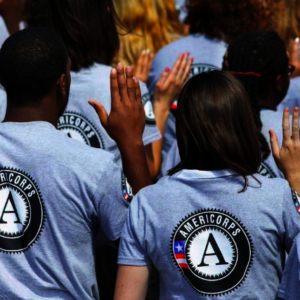Do Americans owe the country national service? Should the government mandate that we somehow serve?
The answer is clearly spelled out in the Declaration of Independence, which states that we are each endowed with certain “unalienable Rights, that among these are Life, Liberty and the pursuit of Happiness. — That to secure these rights, Governments are instituted among Men, deriving their just powers from the consent of the governed.”
We’re not here to serve the government, state, nation or whatever you want to call it. The government is here to protect us, to let us each live our own lives and pursue our own dreams as we see fit, as long as we respect the equal rights of others, dealing with our neighbors based on mutual consent.
When President Kennedy urged us to “Ask not what your country can do for you, ask what you can do for your country,” he was asking us to surrender the moral principle of individualism on which the country was founded.
The Declaration should close the book on the national service issue. And certainly, government-mandated national service by any sane understanding violates the Constitution. The 13th Amendment states, “Neither slavery nor involuntary servitude … shall exist within the United States.” The Fifth Amendment states that “No person shall … be deprived of life, liberty, or property, without due process of law.” Government agents coming to my door with guns to force me to perform some high-sounding task approved by the government certainly goes against those protections of our liberty.
There are, however, more subtle aspects to the national service issue.
Across party lines in recent decades, we see national service touted as a virtue and government programs offered to facilitate it. Under President Bill Clinton, AmeriCorps would hand out tax dollars to help college students with tuition. In exchange, upon graduation those students were to work for several years in service programs, receiving paychecks from the federal government, a double whammy on taxpayers. Community organizer-turned president Barack Obama was all about expanding AmeriCorps. President George W. Bush wanted to enlist 100,000 citizens over 55 years of age in a Senior Corps, costing more than $50 million in taxpayer dollars.
But paying one to “serve the country” by using other people’s money — the taxpayers — certainly violates the moral percept that a good act should be voluntary.
Such programs also fog the minds of Americans to the great truth that the incredible prosperity and economic opportunity in this country are the results not of forced national service or even service based on bribery with taxpayer money. They are the results of the free market system in which we each pursue our rational self-interest by producing goods and services with which to trade with our fellows.
A Steve Jobs who didn’t finish a year of college but helped launch the communications and information revolution did more to “serve” the nation than thousands of government-paid service “volunteers.”
Rather than valuing service to the nation, we should value achievement in pursuit of our own dreams, whether nurturing a child to maturity or business to profitability, writing a song, poem, business plan or dissertation, or laying the bricks to a building or designing it.
Of course, part of what we value is living in communities of values with others. Here is a valid version of voluntarism that does not involve self-negation. We help family and close friends as well, not out of joyless duty but because those individuals are of value to us and give us joy. On a basic human level, if we see neighbors in temporary distress, perhaps from an illness, death in the family, or natural disaster, we will usually generously help them without being forced to do so by governments.
Perhaps we have a cause that is a passion we wish to pursue. We want to rid the world of some ailment that has afflicted us or taken a loved one from us. We want to bring the joys of classical music or jazz, ballet, or swing dancing to a younger generation. We’re not serving causes “higher than ourselves” but causes all about ourselves.
Whatever the passion, as Americans, we’ve historically not waited on government to act. The great 19th-century commentator on this country, Alexis de Tocqueville, observed that “Americans of all ages, all stations in life, and all types of dispositions are forever forming associations.”
National service serves neither the nation nor the individuals who make it up. Pursuing our own goals, dealing with our fellows based on mutual consent, and working freely with others to create the communities we value is what made this nation great.

